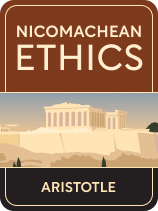

This article is an excerpt from the Shortform book guide to "Nicomachean Ethics" by Aristotle. Shortform has the world's best summaries and analyses of books you should be reading.
Like this article? Sign up for a free trial here .
What did Aristotle say about wisdom as a virtue? Why did he believe it was superior?
In an effort to prove that wisdom is the greatest virtue of all, Aristotle explains how the virtue of wisdom is superior to moral virtues. He claims that wisdom is superior because it’s self-sufficient and divine.
Let’s take a look at Aristotle’s view on the virtue of wisdom as presented in his Nicomachean Ethics.
Wisdom Is Self-Sufficient
Morally virtuous actions require situations, things, or other people—and contemplative activities require none of this. A person can contemplate whenever they want to without needing anything else.
This is not only useful in a practical sense but also suggests reason sits higher on the hierarchy of goods than moral virtues. Because moral virtues relate to other people and things, they necessarily lead to some other good—for example, moderation might lead to physical health, and courage might lead to honor and respect from others. However, people pursue philosophical inquiry for the sake of wisdom and nothing else. And, as Aristotle shows in the hierarchy of good, actions done for their own sake are better than actions done for other benefits.
(Shortform note: Many critics contest Aristotle’s claim that the virtue of wisdom is self-sufficient. They argue that using wisdom requires resources and working with others—Aristotle even acknowledges that happiness requires prosperity (which we’ll discuss later) as well as relationships with other people. After all, it’s hard to imagine how someone could philosophize with nobody to learn from or no free time. Some defenders of Aristotle argue that “self-sufficiency” actually refers to the goal of the activity. From this point of view, a life of philosophy isn’t self-sufficient because it requires no people or things—instead, it’s self-sufficient because its goal (philosophical knowledge and happiness) exists separate from any person or object.)
Wisdom Is Divine
In addition to the self-sufficiency of wisdom, Aristotle suggests that philosophical inquiry is a divine activity: It’s the activity of the gods and is therefore superior to all strictly human activities. Aristotle says the gods are virtuous by their very nature, as they are perfect. But, virtue requires action—so Aristotle must determine what actions make the gods virtuous.
Aristotle argues that morally virtuous actions can’t be the source of their happiness, as they require interactions nobody would associate with the gods. For example, saying the gods are moderate implies that perfect divine beings have physical desires that they must restrain.
Intellectual virtues besides wisdom also involve other objects or people—and so it wouldn’t make sense to say the gods act on those virtues. For example, perfect divine beings don’t spend time acting on their technical knowledge of carpentry to build tables and chairs—it’s ridiculous to imagine an all-powerful being needing a chair to sit on or sell.
Since no other moral or intellectual virtues make sense to describe the activities of the gods, Aristotle concludes that the gods are virtuous because they act in accordance with the virtue of wisdom—that is, they contemplate. Therefore, wisdom is the most divine virtue and contemplation is the most divine activity. And since the gods are perfectly virtuous, perfectly happy, and they only contemplate, Aristotle concludes that a perfectly happy life is a life of activity aligned with the virtue of wisdom (contemplation).
(Shortform note: Aristotle’s conception of the gods doesn’t fully match what you might know as Greek mythology: the stories of gods like Zeus and Athena told by Homer and Hesiod. In these mythological works, the gods are imperfect and prone to the same vices as humans—vices like jealousy, rage, and pettiness. In addition, they also frequently interact with each other and with objects in the world—so from a Homeric perspective, the gods can and do act on virtues besides wisdom. However, Aristotle strongly disagrees with the Homeric view of the gods. He generally talks about the gods as perfectly divine ideals, rather than as flawed and emotional beings. Aristotle uses this idea of the gods in his argument that they only act on wisdom.)

———End of Preview———
Like what you just read? Read the rest of the world's best book summary and analysis of Aristotle's "Nicomachean Ethics" at Shortform .
Here's what you'll find in our full Nicomachean Ethics summary :
- Aristotle's philosophies on topics such as happiness, virtue, and wisdom
- What it means to be morally virtuous and how someone can develop moral virtue
- How wisdom contributes to the possibility of a happy life







I was looking for wisdom and virtues when I Come to pass on your article which is very contemplative thinking.
Thank you.
Harold Marie
Mauritius.